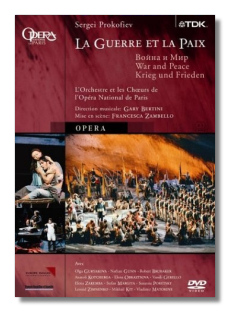
The Internet's Premier Classical Music Source
Related Links
- Prokofieff Reviews
- Latest Reviews
- More Reviews
-
By Composer
-
Collections
DVD & Blu-ray
Books
Concert Reviews
Articles/Interviews
Software
Audio
Search Amazon
Recommended Links
Site News
 DVD Review
DVD Review
Serge Prokofieff

War and Peace
- Olga Guryakova (Natasha Rostova)
- Nathan Gunn (Andrei Bolkonsky)
- Robert Brubaker (Pierre Bezhukov)
- Anatoly Kotcherga (Field Marshal Kutuzov)
- Elena Obraztova (Maria Akhrossimova)
- Vassily Gerello (Napoleon)
- Elena Zaremba (Countess Helena Bezhukova)
- Stefan Margita (Anatole Kuragin)
David Levi, Chorus Master
Francesca Zambello, Stage Director
Orchestra & Chorus of the Opera National de Paris/Gary Bertini
TDK DVOPWP 2DVDs Widescreen Subtitles LPCM Stereo DTS Dolby Digital 210m + 79m
Mahler predicted that his time would come. After five decades of neglect, it finally did, but not, I'm convinced, entirely because the world finally grew to recognize the artistic merit of his music. His popularity began rising about the time stereo LPs were being issued. Cycles of his symphonies began appearing in abundance in the 1970s, during the rise of audiophile listening systems, the period of multi-miking, of big sound in general. The epic nature of his music and the vastness of his sound world could for once be captured in vivid, powerful sonics, and if you wanted to show off 'your system' to friends, what better music could you choose than a Mahler symphony? There's little doubt that Mahler profited from technology, as did other composers of big scores, like Shostakovich.
Just as the LP, Stereo, Digital and CD eras ushered in changes, the DVD age has too. DVD technology can capture both powerful sonics and vivid scenery and action. Opera and ballet issues abound already, while purely instrumental music is not nearly as dominant as it was in the CD or LP eras. Symphonic and instrumental concerts have a missing tooth in the DVD medium: You get to watch the performance alright, but seeing the orchestra or ensemble play the music doesn't quite rise up to the thrill and colorful level of watching it danced to, or sung to by costumed characters having illicit affairs and plotting murders.
It is logical to assume then that those composers who wrote masterful operas and ballets, as well as symphonic and various other instrumental works will benefit most from the DVD medium. Who fills that bill as well as anyone else? Serge Prokofieff, of course. With his eight ballets, that include Roméo and Juliet, Cinderella, The Stone Flower and various earlier efforts like Chout and Le Pas D'acier, and his eight operas, among which are War and Peace, The Fiery Angel, The Gambler, The Love for Three Oranges, and Betrothal in a Monastery – most gaining considerable attention on the world's stages of late – he is likely to outpace his rivals in the 20th century, if he hasn't already. In sum, Prokofieff, already quite popular, is having his time come, too – again!
And this issue helps contribute toward that end. This is an excellent War and Peace, rivaling the Rostropovich and Melik-Pashayev and outpacing the Hickox. In fact, it contains the best singing of all of them. Olga Guryakova may not outdo Vishnevskaya in the Melik-Pashayev, but she has a more radiant voice than Vishnevskaya did for the Rostropovich. In the end, too, I think she has a more beautiful voice. Nathan Gunn and Robert Brubaker both are excellent, too, as are the two opposing figures in the War section, Kutuzov (Anatoly Kotcherga) and Napoleon (Vassily Gerello). The latter two come across brilliantly as the larger-than-life figures they portray.
Gary Bertini conducts with an almost unerring sense for the correct tempo, and manages to draw fairly spirited playing from his French players, not always an easy task in an unwieldy masterwork like this. There are some imprecisions from both the singers and players, as well as orchestral imbalances, certainly the result of the miking setup, but the sound is generally quite good, with the voices of the individual singers and the chorus having good presence. This performance, by the way, recorded in March 2000, was originally shown on French television, and here contains 79 minutes of behind-the-scenes footage of great interest, dealing mainly with the difficulties confronting the brilliant stage director Francesca Zambello.
The only drawback to this recording (and some might not consider it a drawback in view of the length of this opera) is that it is cut, unlike the Rostropovich and Hickox versions. The closing chorus, for instance, containing the famous big theme (also used in Ivan the Terrible), is shorn of its middle section, following the pattern of the Melik-Pashayev recording. The overture is eliminated too, and there are several cuts in the War half of the work, most heavily in the tenth scene, Kutuzov's War Council, arguably the least effective scene in the opera, however.
At the moment, the only other DVD of War and Peace is the Gergiev, probably the weakest effort in his nearly-complete cycle of Prokofieff operas. Even if the competition were stronger, this TDK issue would still be a most desirable DVD to have. Urgently recommended!
Copyright © 2003, Robert Cummings


















